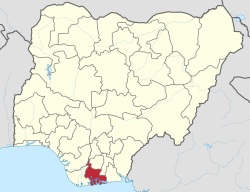INTRODUCTION
Rivers State is one of the six states that make up the South-South geopolitical zone of Nigeria. It is bounded to the North by Imo, Abia, and Anambra States, to the East by Akwa Ibom State, to the South by the Atlantic Ocean, and to the West by Bayelsa and Delta States. The state capital is Port Harcourt.
LANDMASS, LOCATION AND POPULATION
Rivers State lies at latitude 4°45’ North and longitude 6°50’ East. It covers an area of 11,077 square kilometres. It has a population of 5,198,716 (2006 census) 7,303,924 (2016 forecast) and a population density of 469. The state accounts for 3.7% of Nigeria’s total population.
HISTORY AND PEOPLE
The earliest settlements in Rivers State were the kingdoms of Bonny, Opobo and Kalabari. Their proximity to the coast and oil palm-rich hinterland made them important and they thrived on the trade between the Europeans and inland natives. The state derives its name from the rivers that border its territory.
Rivers State was originally part of the Eastern Region in the three-region structure of 1954. It then became one of the twelve states created in 1967 by General Yakubu Gowon’s military government. In 1996, Rivers State was almost halved in size by the military government of General Sanni Abacha after a portion of it was carved out to form Bayelsa State.
Rivers State is home to a variety of ethnic groups, the most predominant of which are the Ijaw, lkwere, Kalabari, Ndoni and Okrika. There are twenty-three languages in the state, the major ones being Igbo and Ikwere. 80% of the population are Christians but traditional religion and Islam are also practised there.
MAIN TOWNS AND CITIES
Port Harcourt (capital), Ahoada, Bonny, Bori, Buguma, Degema, Gokana, Okrika and Opobo
LOCAL GOVERNMENT AREAS
ADMINISTRATORS AND GOVERNORS
Alfred Diete-Spiff (Governor – Military): May 1967 – July 1975
Zamani Lekwot (Governor – Military): July 1975 – July 1978
Suleiman Saidu (Governor – Military) July 1978 – October 1979
Melford Okilo (Governor – Civilian (National Party of Nigeria)): October 1979 – December 1983
Fidelis Oyakhilome (Governor – Military): January 1984 – August 1986
Anthony Ukpo (Governor – Military): August 1986 – July 1988
Ernest Adelaye (Governor – Military): July 1988 – August 1990
Godwin Abbe (Governor – Military): August 1990 – January 1992
Rufus Ada-George (Governor – Civilian (National Republican Convention)): January 1992 – November 1993
Dauda Komo (Administrator – Military): December 1993 – August 1996
Musa Shehu (Administrator – Military): August 1996 – August 1998
Sam Ewang (Administrator – Military): August 1998 – May 1999
Peter Odili (Governor – Civilian (People’s Democratic Party)): May 1999 – May 2007
Celestine Omehia (Governor – Civilian (People’s Democratic Party)): May 2007 – October 2007
Rotimi Amaechi (Governor – Civilian (People’s Democratic Party/All Progressives Congress)): October 2007 – May 2015
Nyesom Wike (Governor - Civilian (People's Democratic Party)): May 2015- Present
ECONOMY AND EDUCATION
Rivers State has tropical rainforests as well as mangrove and saltwater swamps. The overwhelming majority of the people in the state are involved in two primary activities: farming and fishing. Major cash crops in the state include oil palm, rubber, raffia palm and jute, while the state’s main minerals are petroleum and natural gas. Other minerals are clay, industrial sand, lignite and marble. The major industries in Rivers State are petroleum and petrochemical related industries. The state has two major refineries, two major seaports, an airport and various industrial estates.
The tertiary institutions in the state are University of Port Harcourt, Choba; Federal College of Education (Technical), Omoku; Federal Polytechnic, Omoku; Rivers State University of Science and Technology, Port Harcourt; Rivers State Polytechnic; Bori; Rivers State University of Education, Nkpolu Oroworuku; Ignatius Ajulu University of Education, Rumuolumeni; School of Health Technology, Port Harcourt; School of Nursing and Midwifery, Rumueme; and Rivers State College of Arts and Science, Port Harcourt.
FAMOUS SITES AND CULTURE
Sites
King Jaja of Opopo Statue, Opobo
The King Jaja of Opobo statue in Opobo town is a bronze monument erected in 1963 in memory of Jaja of Opobo, merchant prince and founder of the Opobo city-state. Born in present day Imo State, Jaja was sold into slavery but gained his freedom after years of service. He made Opobo a prominent palm oil trading post but was exiled following quarrels with the British and died on his way back to Opobo in 1891. He was revered for his commercial, political and military acumen.
Port Harcourt Tourist Beach, Port Harcourt
The Port Harcourt Tourist Beach is a man-made beach located along Kolabi Creek. It's a white sand beach created in 1988 as a tourist attraction with a museum and cultural centre.
Isaac Boro Park, Port Harcourt
The Isaac Boro Park is named after Isaac Adaka Boro, one of the pioneers of minority rights activism in Nigeria. The annual International Trade Fair, Armed Forces Remembrance Day and Workers’ Day celebrations are all held in the Park.
Culture
The Oki festival is a ceremonial dance among the people of Kalabari. The dancers who take part in the festival represent a family of fish and exhibit their fish-like dance during the festival. The people of Obele and Omuawa communities in Emohua and Ikwerre local government areas organise traditional Inter-wrestling contests every year to display their cultural heritage. The festival also provides for peace building among inhabitants of the two clans.
Others cultural events include the Ekpeye Masquerade festival and Iria festival in Okrika.
NOTABLE INDIGENES
King Jaja of Opobo (1821–1891
Rex Lawson (1938 -1971)
DID YOU KNOW
The city of Port Harcourt was named after Lewis Vernon Harcourt in 1913 by Lord Frederick Lugard. It was originally known as Iguocha.
RIVERS STATE IN PICTURES

